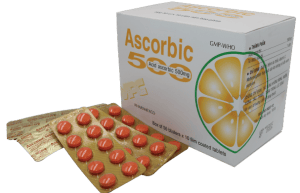This is an automatically translated article.
Vitamin C is an essential vitamin because your body cannot produce it. Vitamin C offers many great health benefits. Supplementing vitamin C from food is best, besides, many people turn to supplements to meet their needs. Here are 7 scientifically proven benefits of vitamin C supplementation.1. May reduce the risk of chronic disease
Vitamin C is a powerful antioxidant that can strengthen the body's natural defenses. Antioxidants are molecules that help boost the immune system by protecting cells from harmful molecules, called free radicals.When free radicals accumulate, they can promote a state known as oxidative stress that is linked to many chronic diseases. Studies show that consuming more vitamin C can increase blood antioxidant levels by up to 30%. This gives the body a natural defense against inflammation.
2. May help control high blood pressure
About one-third of American adults have high blood pressure. High blood pressure puts you at risk for heart disease, which is the leading cause of death globally.Studies have shown that vitamin C supplements can help lower blood pressure in both people with and without high blood pressure.
An animal study found that supplementing with vitamin C helped dilate blood vessels from the heart throughout the body, helping to lower blood pressure levels.
Furthermore, a meta-analysis of 29 human studies found that vitamin C supplementation reduced systolic blood pressure (upper value) by 3.8 mmHg and mean diastolic (lower value) blood pressure. average 1.5 mmHg in healthy adults.
In adults with high blood pressure, vitamin C supplementation reduced systolic blood pressure by 4.9 mmHg and diastolic blood pressure by 1.7 mmHg, on average.
Although these results are promising, it is not clear whether the effects on blood pressure are long-lasting. Furthermore, people with high blood pressure should not rely solely on vitamin C for treatment.

Việc bổ sung vitamin C sẽ giúp bạn kiểm soát huyết áp tốt hơn
3. May reduce the risk of heart disease
Heart disease is the leading cause of death worldwide. Many factors increase the risk of heart disease, including high blood pressure, high levels of triglyceride or LDL (bad) cholesterol, and low levels of HDL (good) cholesterol.Vitamin C can help reduce these risk factors, thereby reducing your risk of heart disease.
For example, a meta-analysis of results from 9 studies with 293,172 participants found that after 10 years, those taking at least 700 mg of vitamin C per day had a 25% lower risk of heart disease than those who did not. do not take vitamin C supplements.
However, scientists are unsure whether people who consume foods rich in vitamin C follow a healthier lifestyle than those who do not take supplements. Therefore, it remains unclear whether the difference is due to vitamin C or other aspects of their diets.
Another analysis from 13 studies looked at the effects of taking at least 500 mg of vitamin C per day on heart disease risk factors, such as blood cholesterol and triglyceride levels. The analysis showed that vitamin C supplementation significantly reduced LDL (bad) cholesterol by about 7.9 mg/dL and blood triglycerides by 20.1 mg/dL.
In summary, it seems that taking or consuming at least 500 mg of vitamin C per day can reduce the risk of heart disease. However, if you already consume a diet rich in vitamin C, the supplements may not provide additional heart health benefits.
4. Reduces uric acid levels in the blood and helps prevent acute gout
Gout is a type of arthritis that affects about 4% of American adults. The disease is very painful and is associated with arthritis, especially in the big toes. People with gout experience sudden, intense swelling and pain.Gout symptoms appear when there is too much uric acid in the blood. Uric acid is a waste product produced by the body. In high concentrations, it can crystallize and deposit in joints.
Some studies have shown that vitamin C can help reduce uric acid in the blood and, therefore, protect against gout attacks.
For example, a study including 1,387 men found that those who consumed the most vitamin C had significantly lower blood uric acid levels than those who consumed the least.
Another study followed 46,994 healthy men for over 20 years to determine if vitamin C intake was associated with developing gout. The results showed that those taking vitamin C supplements had a 44 percent lower risk of gout.
Although there seems to be a strong link between vitamin C intake and uric acid levels, more research is needed on the effects of vitamin C on gout.

Một số nghiên cứu đã chứng minh Vitamin C có thể giúp bạn chống lại sự tấn công của bệnh gút
5. Helps prevent iron deficiency
Iron is an important nutrient that has many functions in the body. It is essential for making red blood cells and transporting oxygen throughout the body.Vitamin C supplements can help improve the absorption of iron from the diet. Vitamin C aids in the conversion of hard-to-absorb iron, such as plant-based sources of iron, into a more absorbable form.
This is especially helpful for people on a meat-free diet, as meat is the main source of iron. In fact, consuming just 100 mg of vitamin C can improve iron absorption by as much as 67%. Therefore, vitamin C may help reduce the risk of anemia in people who are prone to iron deficiency.
If you have low iron, consuming more foods rich in vitamin C or taking vitamin C can help improve your blood iron levels.
6. Immune Booster
One of the main reasons many people take vitamin C supplements is to boost their immunity, as vitamin C is involved in many parts of the immune system.First, vitamin C helps encourage the production of white blood cells called lymphocytes and phagocytes, which help defend the body against infection.
Second, vitamin C helps these white blood cells work more efficiently by protecting them from damage caused by other damaging molecules, such as free radicals.
Third, vitamin C is an essential part of the skin's defense system. Vitamin C is very actively transported to the skin, where it can act as an antioxidant and help strengthen the skin barrier.
Studies have also shown that taking vitamin C can shorten wound healing time. Additionally, low vitamin C levels are associated with poor health outcomes. For example, people with pneumonia tend to have lower vitamin C levels, and vitamin C supplements have been shown to shorten recovery time.

Vitamin C có thể giúp tăng cường hệ miễn dịch
7. Protect your memory and thinking as you age
Dementia is a broad term used to describe symptoms of poor thinking and memory. This condition affects more than 35 million people worldwide and usually occurs in older people.Studies show that oxidative stress and inflammation near the brain, spine, and nerves (all three of these sites are known as the central nervous system) can increase the risk of dementia .
Vitamin C is a powerful antioxidant. Low levels of this vitamin have been linked to the ability to think and remember. Additionally, some studies have shown that people with dementia may have lower blood levels of vitamin C.
High amounts of vitamin C from foods or supplements have been shown to protect thinking and memory as you age. Vitamin C supplements can help fight conditions like dementia if you're not getting enough vitamin C from your diet. However, more human studies are needed to understand the effects of vitamin C supplements on nervous system health.
Reference source: healthline.com













